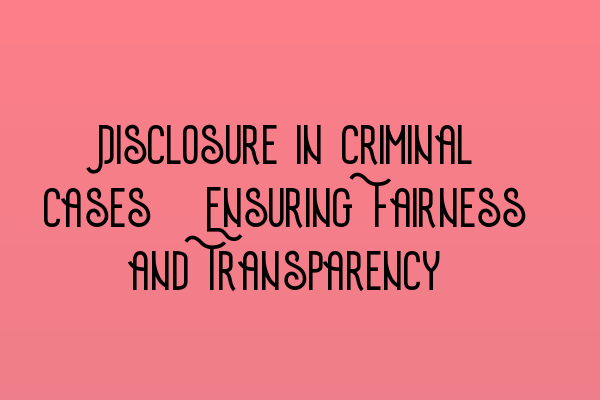Disclosure in Criminal Cases: Ensuring Fairness and Transparency
In the criminal justice system, disclosure plays a crucial role in ensuring fairness and transparency. It is the process by which the prosecution and defense exchange relevant information and evidence related to the case. This disclosure process allows both sides to prepare their cases effectively and facilitates a fair trial.
The principle of disclosure is important because it helps to safeguard the rights of the accused, as well as ensuring the integrity of the criminal justice system as a whole. Without transparency and access to all relevant information, a defendant may be denied the opportunity to present a full and proper defense.
One of the key responsibilities of the solicitor in a criminal case is to ensure that all relevant materials in their possession are disclosed to the defense. This can include witness statements, forensic evidence reports, expert opinions, and any other evidence that may support the accused’s case. Failure to disclose such information can have serious consequences and can lead to miscarriages of justice.
At SQE Criminal Law & Practice Law UK, we understand the importance of disclosure in criminal cases. Our team of experienced solicitors is well-versed in the disclosure process and ensures that all necessary steps are taken to promote fairness and transparency.
To facilitate effective disclosure, solicitors must carefully review all materials related to the case and identify anything that may be relevant to the defense. This can be a time-consuming process, as it involves sifting through extensive amounts of evidence. However, it is a crucial step to ensure that all relevant information is disclosed.
It is also essential for solicitors to maintain open lines of communication with the prosecution and defense teams throughout the disclosure process. This helps to address any concerns or issues that may arise and allows for the exchange of information in a timely manner.
Another important aspect of disclosure is the duty to disclose unused material. This refers to evidence or information that is not presented as part of the prosecution’s case but may be relevant to the defense. Solicitors have a duty to consider whether such material should be disclosed and to bring it to the attention of the court.
The duty of disclosure extends to both the prosecution and defense, and it is important that both parties comply with their obligations. The prosecution must disclose all material that may assist the defense or undermine the prosecution’s case, while the defense has a duty to disclose any material that may be relevant to the prosecution or that may be required by law.
To ensure fairness and transparency, it is essential that the disclosure process is conducted in a timely and efficient manner. Delays in disclosing information can cause unnecessary delays in the proceedings and may impede the administration of justice.
In recent years, the advent of digital technology has presented new challenges and opportunities in the disclosure process. With the increasing reliance on digital evidence, solicitors must be adept at handling electronic materials and understanding the potential implications they may have on the case.
At SQE Criminal Law & Practice Law UK, we stay up-to-date with the latest developments in the disclosure process and digital evidence. Our team of solicitors is equipped with the knowledge and expertise to effectively handle and disclose electronic materials, ensuring that our clients receive a fair and transparent legal representation.
In conclusion, disclosure is a fundamental aspect of the criminal justice system that ensures fairness and transparency in criminal cases. It is the duty of solicitors to diligently review all materials and disclose relevant information to facilitate a fair trial. At SQE Criminal Law & Practice Law UK, we prioritize the principles of fairness and transparency, making sure that our clients’ rights are protected. If you are seeking legal assistance or are interested in learning more about the SQE exams and preparation courses, please feel free to visit the following links: SQE 1 Practice Exam Questions, SQE 1 Practice Mocks FLK1 FLK2, SQE 2 Preparation Courses, SQE 1 Preparation Courses, and SRA SQE Exam Dates.
